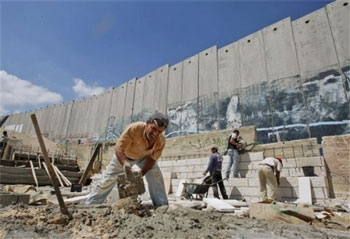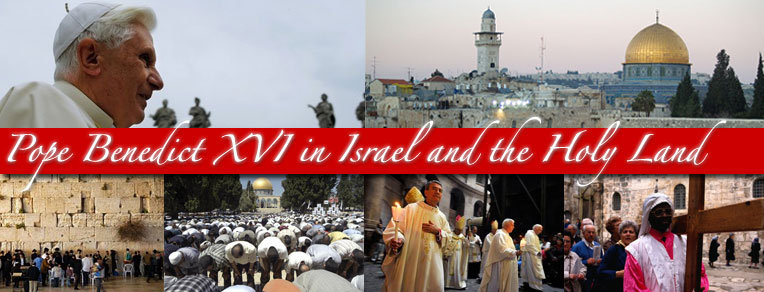When her children were growing up there was an open field opposite their apartment building and she would spend most of her time there, letting them tumble about as they enjoyed picnic lunches. Today, the building -- which has grown by four floors as sons and cousins have married and built apartments for their wives -- overlooks the stage in front of the Israeli separation barrier from which the pope will address the camp's 4,860 residents.

Palestinian workers build a stage next to Israel's separation barrier in the Aida refugee camp near the West Bank town of Bethlehem. Source: AP
While much of the camp is a jumble of narrow, sunless, garbage-strewn alleyways, on his visit the pope will be taken down the wide dusty main road to the stage abutting the wall, which separates the camp from Bethlehem.According to the article, the Pontifical Mission for Palestine -- a Vatican-founded relief agency under the direction of the New York-based Catholic Near East Welfare Association -- is helping provide aid and assistance to the residents of the camp:"I don't know what he is coming to do," said Mourad Malash, 23, who is unemployed and spends his time between his home and the houses of his friends. "He should ask the youth how they feel. Can he find jobs for the people?"
"The most important man in the world is coming here. He can bring thousand of journalists with him (to see our life here)," [Salah] Ajaram said. "He can be close to the wall and see how the wall separates our lives between our people. He is the one to talk about justice and peace. We feel there can be no justice without the right of return and the pope can take this message out with him.Salah Ajaram, 36, is general manager of the camp's Lajee cultural center and a member of the coordinating committee for the pope's visit. (Read the rest of Catholic News Service's report)."To stay in your country as a refugee is more difficult than living as one outside," Ajaram added.










No comments:
Post a Comment